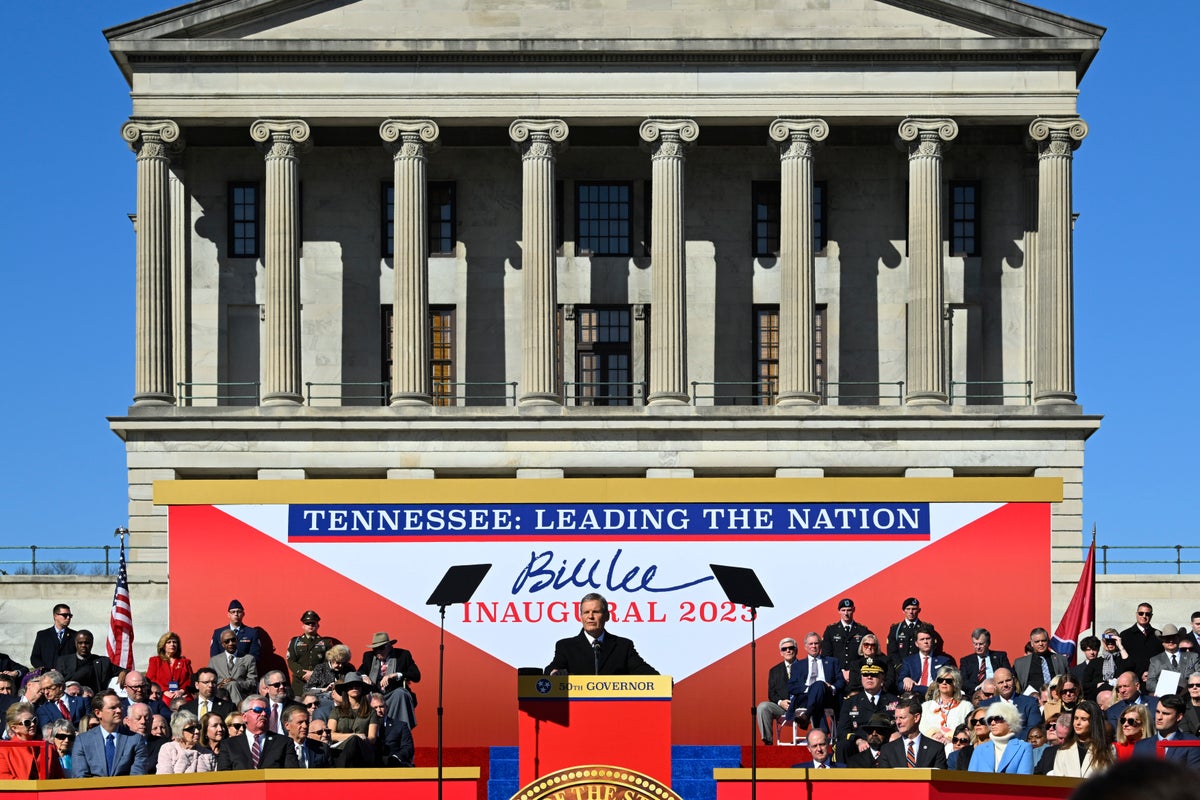
Tennessee Gov. Bill Lee kicked off his second term on Saturday, promising to focus over the next four years on improving aging transportation systems, advocating for better conservation efforts and protecting the state's most vulnerable children.
Lee, a Republican, took the oath of office in front of the Tennessee Capitol on a bright sunny day — marking a stark difference to the governor's first inauguration when harsh weather forced the historically held outdoor ceremony into a smaller inside venue.
Lee pointed to his push to revamp the state's complicated education funding system as top accomplishments of his first term, as well as his administration's work with Ford Motor Co. to build an electric vehicle and battery plant near Memphis.
Yet Lee acknowledged that his first term involved deep challenges ranging from overseeing the COVID-19 pandemic, multiple fatal tornadoes, catastrophic flooding, wildfires and the 2020 Christmas morning bombing in downtown Nashville. Lee's wife, Maria, has also been diagnosed with cancer and is receiving treatments for lymphoma.
“While Maria and I are in a time of struggle, we know that we are not alone in these hardships,” Lee said.
The 63-year-old governor stressed his commitment to civility and dismissed critics of his administration “who thrive on toxic incivility and divisiveness.” It's been a theme throughout that Lee has repeated ever since he launched his political career in 2017 with his first run for governor.
“We can disagree and stand firm for our beliefs and our principles, but we should never forget the dignity of the other human being,” Lee said. “We should never believe differences are a platform for demonization, or that one man has any greater value than another.”
Lee's comments come as he has signed off on a wave of anti-LGBTQ legislation throughout his first term. and has strongly defended Tennessee's abortion ban — which is one of the country's strictest — and downplayed calls to add exemptions to the law. Most recently, Lee's Department of Health announced it would forgo federal funding to treat and prevent HIV that critics have alleged was a move to stop working with Planned Parenthood.
With his eye on his next term, Lee once again touted his sweeping transportation proposal, which will need legislative approval in the coming weeks. He then pushed for the need to “enhance efforts to conserve our natural resources and preserve the environment.” The governor did not, however, expand on what environmental conservation actions he would pursue.
Lee also touched on the state's troubled Department of Children's Services, where a recent audit found that the agency has failed to properly protect kids placed in state custody.
“We need to protect children in our custody and in our state with a better foster care and adoption process,” Lee said. “We need to do these things and many more, but we can never abandon the standard of fiscal responsibility that makes our success possible.”
Sen. London Lamar, a Democrat from Memphis, encouraged Lee to help working and middle class families during his second term and put aside “ideological agendas.”
“We hope Gov. Lee’s second term is defined by expanding access to affordable health care, housing and child care; strengthening our public schools, our democracy and state services; and a rejection of the extreme partisanship and division that marked his first term," said the chair of the Senate Democratic Caucus.
A businessman and farmer, Lee handily won reelection last fall in a state that has not seen a Democrat in the top statewide office in more than a decade. His win came after he was the first incumbent governor in about three decades to have no primary opponent. He avoided an intraparty challenge in August in part by leading on legislation on some of the most fiery socially conservative topics, including the right to carry handguns in public without a permit and a strict abortion ban, both of which he signed into law.
To date, Lee has never vetoed a bill sent to his desk from the Republican-dominated Legislature, but he has occasionally let some become law without signing them to signal his unease.
His office does exercise another powerful tool given to governors: executive privilege to keep government records private. Lee once promised to overhaul Tennessee’s public records and open meeting laws, but no action has been taken to date.
"You and I, and this state, have been entrusted with treasures, not meant to be buried but to be spent on helping our fellow man," Lee said. “We should recognize our treasures, celebrate our accomplishments, and be challenged by what lies ahead.”







